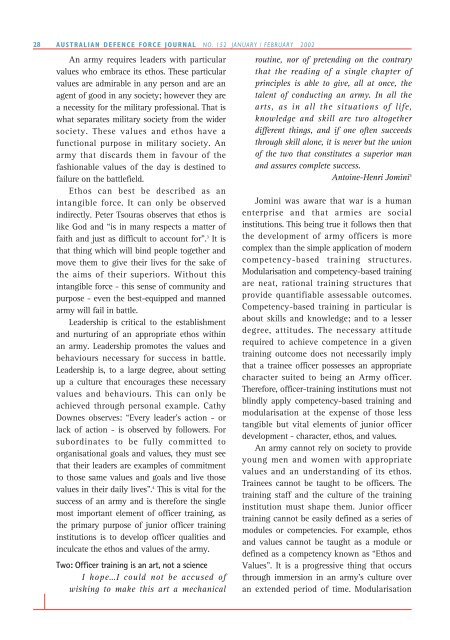ISSUE 152 : Jan/Feb - 2002 - Australian Defence Force Journal
ISSUE 152 : Jan/Feb - 2002 - Australian Defence Force Journal
ISSUE 152 : Jan/Feb - 2002 - Australian Defence Force Journal
- No tags were found...
Create successful ePaper yourself
Turn your PDF publications into a flip-book with our unique Google optimized e-Paper software.
28AUSTRALIAN DEFENCE FORCE JOURNAL NO. <strong>152</strong> JANUARY / FEBRUARY <strong>2002</strong>An army requires leaders with particularvalues who embrace its ethos. These particularvalues are admirable in any person and are anagent of good in any society; however they area necessity for the military professional. That iswhat separates military society from the widersociety. These values and ethos have afunctional purpose in military society. Anarmy that discards them in favour of thefashionable values of the day is destined tofailure on the battlefield.Ethos can best be described as anintangible force. It can only be observedindirectly. Peter Tsouras observes that ethos islike God and “is in many respects a matter offaith and just as difficult to account for”. 3 It isthat thing which will bind people together andmove them to give their lives for the sake ofthe aims of their superiors. Without thisintangible force - this sense of community andpurpose - even the best-equipped and mannedarmy will fail in battle.Leadership is critical to the establishmentand nurturing of an appropriate ethos withinan army. Leadership promotes the values andbehaviours necessary for success in battle.Leadership is, to a large degree, about settingup a culture that encourages these necessaryvalues and behaviours. This can only beachieved through personal example. CathyDownes observes: “Every leader's action - orlack of action - is observed by followers. Forsubordinates to be fully committed toorganisational goals and values, they must seethat their leaders are examples of commitmentto those same values and goals and live thosevalues in their daily lives”. 4 This is vital for thesuccess of an army and is therefore the singlemost important element of officer training, asthe primary purpose of junior officer traininginstitutions is to develop officer qualities andinculcate the ethos and values of the army.Two: Officer training is an art, not a scienceI hope…I could not be accused ofwishing to make this art a mechanicalroutine, nor of pretending on the contrarythat the reading of a single chapter ofprinciples is able to give, all at once, thetalent of conducting an army. In all thearts, as in all the situations of life,knowledge and skill are two altogetherdifferent things, and if one often succeedsthrough skill alone, it is never but the unionof the two that constitutes a superior manand assures complete success.Antoine-Henri Jomini 5Jomini was aware that war is a humanenterprise and that armies are socialinstitutions. This being true it follows then thatthe development of army officers is morecomplex than the simple application of moderncompetency-based training structures.Modularisation and competency-based trainingare neat, rational training structures thatprovide quantifiable assessable outcomes.Competency-based training in particular isabout skills and knowledge; and to a lesserdegree, attitudes. The necessary attituderequired to achieve competence in a giventraining outcome does not necessarily implythat a trainee officer possesses an appropriatecharacter suited to being an Army officer.Therefore, officer-training institutions must notblindly apply competency-based training andmodularisation at the expense of those lesstangible but vital elements of junior officerdevelopment - character, ethos, and values.An army cannot rely on society to provideyoung men and women with appropriatevalues and an understanding of its ethos.Trainees cannot be taught to be officers. Thetraining staff and the culture of the traininginstitution must shape them. Junior officertraining cannot be easily defined as a series ofmodules or competencies. For example, ethosand values cannot be taught as a module ordefined as a competency known as “Ethos andValues”. It is a progressive thing that occursthrough immersion in an army's culture overan extended period of time. Modularisation
















